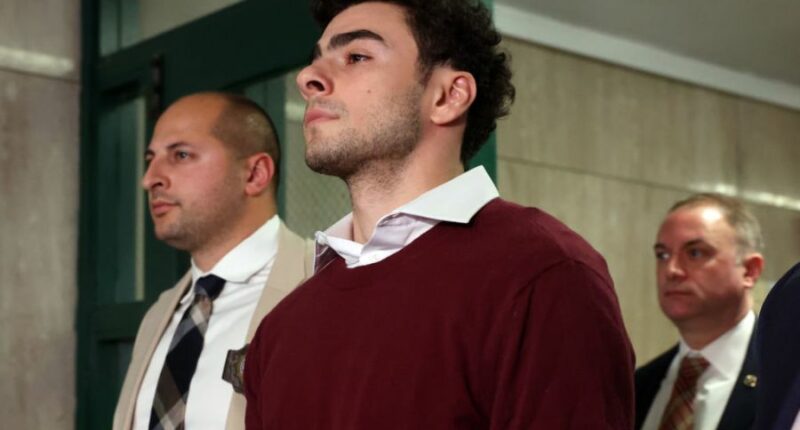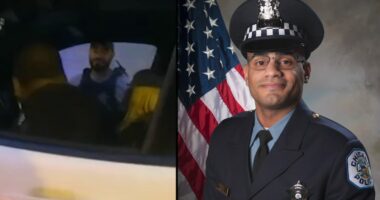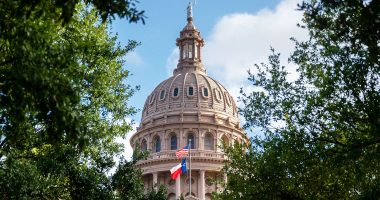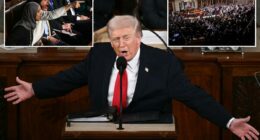Share this @internewscast.com

A judge in New York has thrown out terrorism charges against Luigi Mangione in relation to the murder of UnitedHealthcare CEO Brian Thompson. However, the judge maintained the second-degree murder charges against Mangione, an Ivy League graduate.
Despite Mangione’s legal team arguing that facing both the state charges and a federal death penalty case constituted double jeopardy, Judge Gregory Carro dismissed this claim, indicating it was too early to decide on such grounds.
This marks Mangione’s first court hearing in the state case since February. The 27-year-old has garnered a following as a symbol of discontentment with the health insurance sector. At his previous court appearance, many supporters donned green, reminiscent of the video game character Luigi, to express their solidarity. His federal arraignment in April witnessed similar support.
Judge Carro’s decision articulated that while the murder was far from typical street violence, New York statutes do not label an act as terrorism solely due to ideological motivation.
“Though the defendant clearly held a strong resentment towards UHC and the healthcare sector, it does not necessarily imply he aimed to ‘intimidate and coerce a civilian population,’ and no such evidence was provided,” Carro stated in his ruling.
Carro scheduled pretrial hearings in the case for Dec. 1, which is days before Mangione is next due in court in the federal case against him.
Mangione has pled not guilty to multiple murder charges, including the accusation of committing murder as an act of terrorism in the December 4, 2024, incident. Surveillance footage captured an armed, masked individual shooting Thompson from behind when he arrived at a New York Hilton Midtown investor conference. Authorities noted the words “delay,” “deny,” and “depose” inscribed on the bullets, reflecting phrases often attributed to insurance companies evading claims.
Mangione was arrested five days later after he was spotted eating breakfast at a McDonald’s in Altoona, Pennsylvania, about 230 miles (about 370 kilometers) west of New York City. Since then, he has been held at the same Brooklyn federal jail where Sean “Diddy” Combs is locked up.
The Manhattan district attorney’s office contends that there are no double jeopardy issues because neither of Mangione’s cases has gone to trial and because the state and federal prosecutions involve different legal theories.
Mangione’s lawyers say the dueling cases have created a “legal quagmire” that makes it “legally and logistically impossible to defend against them simultaneously.”
The state charges, which carry a maximum of life in prison, allege that Mangione wanted to “intimidate or coerce a civilian population,” that is, insurance employees and investors. The federal charges allege that Mangione stalked Thompson and do not involve terrorism allegations.
U.S. Attorney General Pam Bondi announced in April that she was directing federal prosecutors to seek the death penalty for “an act of political violence” and a “premeditated, cold-blooded assassination that shocked America.”
The Manhattan district attorney’s office quoted extensively from Mangione’s handwritten diary in a court filing seeking to uphold his state murder charges. They highlighted his desire to kill an insurance honcho and his praise for Ted Kaczynski, the late terrorist known as the Unabomber.
In the writings, prosecutors said, Mangione mused about rebelling against “the deadly, greed fueled health insurance cartel” and said killing an industry executive “conveys a greedy bastard that had it coming.” They also cited a confession they say he penned “To the feds,” in which he wrote that “it had to be done.”
Mangione’s “intentions were obvious from his acts, but his writings serve to make those intentions explicit,” prosecutors said in the June filing. The writings, which they sometimes described as a manifesto, “convey one clear message: that the murder of Brian Thompson was intended to bring about revolutionary change to the healthcare industry.”
















